China’s New AI Talent Visa Policy Boosts Tech Workforce

Introduction
China is taking a significant step to strengthen its technology workforce through a newly announced AI Talent Visa Policy. Designed to attract international and domestic experts in artificial intelligence, the policy aims to accelerate innovation in Chinese tech companies and research institutions. As AI applications expand from industrial automation to healthcare and education, the availability of high-level talent has become critical for sustaining competitive advantage. The new visa framework addresses longstanding concerns regarding talent shortages, regulatory hurdles, and global competition for skilled professionals.
Policy Overview
The AI Talent Visa Policy, introduced by China’s Ministry of Science and Technology, provides preferential residency and employment conditions for qualified AI specialists. Applicants who meet the criteria, including advanced degrees, significant project experience, or leadership roles in AI development, can secure a three-year renewable visa. The policy also allows family members accompanying the visa holder to receive work permits, aiming to attract top talent without disrupting personal life considerations.
The initiative reflects China’s broader strategy to become a global AI powerhouse by 2030. According to the China Academy of Information and Communications Technology (CAICT), the domestic AI industry grew by 35 percent in 2025, and talent bottlenecks remain a limiting factor for further expansion. By facilitating smoother immigration procedures and integrating international talent into local ecosystems, the government hopes to stimulate innovation clusters across key cities such as Beijing, Shanghai, and Shenzhen.
Impact on Tech Workforce
The AI Talent Visa Policy is expected to increase the number of skilled professionals available to Chinese startups and established firms alike. Analysts predict that within two years, the policy could add approximately 5,000–7,000 AI specialists to the workforce, contributing to faster project development cycles and enhanced research output. Companies in sectors ranging from autonomous vehicles to robotics and fintech stand to benefit from the influx of talent capable of handling complex AI algorithms, machine learning models, and quantum computing research.
Moreover, domestic universities are likely to see stronger collaboration with international experts. Joint research initiatives, faculty exchanges, and mentorship programs could enhance the quality of AI education. Institutions such as Tsinghua University and Peking University, which already rank among the top global AI research centers, may leverage the policy to attract visiting professors and postdoctoral researchers, thereby raising China’s profile in global academic networks.
Economic Implications
Beyond talent acquisition, the AI Talent Visa Policy has broader economic implications. By enabling faster deployment of AI technologies, Chinese companies can increase operational efficiency, reduce production costs, and launch innovative products more quickly. For example, AI-driven logistics and supply chain management solutions could improve the efficiency of manufacturing hubs in Guangdong and Jiangsu provinces, potentially boosting output by 15–20 percent over the next three years.
International investors may also view the policy as a positive signal. Firms evaluating partnerships or investments in Chinese AI startups may find enhanced confidence in the availability of qualified personnel to implement cutting-edge solutions. As the policy reduces bureaucratic barriers and clarifies employment terms for foreign specialists, China could see an uptick in venture capital inflows, joint ventures, and multinational R&D projects.
Challenges and Considerations
Despite the potential benefits, several challenges remain. Integrating foreign talent into local corporate culture and navigating language or regulatory barriers can be complex. Experts highlight the need for supportive infrastructure, including housing, social services, and professional networks, to ensure long-term retention. Additionally, companies must maintain compliance with data security regulations and intellectual property protections when onboarding international employees.
Another consideration is the competition with other global AI hubs. The United States, Europe, and Singapore continue to offer attractive conditions for AI professionals, often coupled with established startup ecosystems. China’s success will depend on the policy’s ability to differentiate itself and provide a compelling environment for long-term career growth and innovation opportunities.
Strategic Focus on AI Development
The policy aligns with China’s broader AI development roadmap. According to government reports, AI applications are prioritized in industries such as healthcare diagnostics, autonomous transportation, energy management, and educational technology. By ensuring a robust pipeline of qualified professionals, China aims to accelerate the commercialization of research, support the creation of AI patents, and drive adoption of AI in public and private sectors.
Tech companies are already responding. Firms like Baidu, SenseTime, and iFlytek have announced new AI labs and training programs specifically designed to integrate incoming specialists. These initiatives are expected to enhance collaboration across domestic and international teams and reduce time-to-market for emerging technologies.
Looking Ahead
The AI Talent Visa Policy represents a strategic effort to secure China’s position as a global leader in artificial intelligence. By combining preferential immigration terms, career development opportunities, and institutional support, the government is aiming to create a sustainable pipeline of highly skilled professionals. The success of this policy will not only influence domestic innovation but also shape global AI competition in the coming decade.
Experts recommend monitoring key metrics such as the number of visa approvals, retention rates, startup creation, and patent filings to assess the impact of this policy. As Chinese cities strengthen their AI ecosystems, the ability to attract and retain global talent will be a decisive factor in sustaining innovation momentum.
Conclusion
China’s AI Talent Visa Policy is poised to transform the domestic technology landscape. By addressing critical skill shortages and facilitating international collaboration, the initiative provides a foundation for accelerated growth across AI-intensive industries. While challenges remain in implementation and global competition, the policy reflects China’s commitment to fostering an innovation-driven economy. The influx of talent is expected to reinforce China’s global standing in AI research, commercial applications, and long-term technological leadership.






